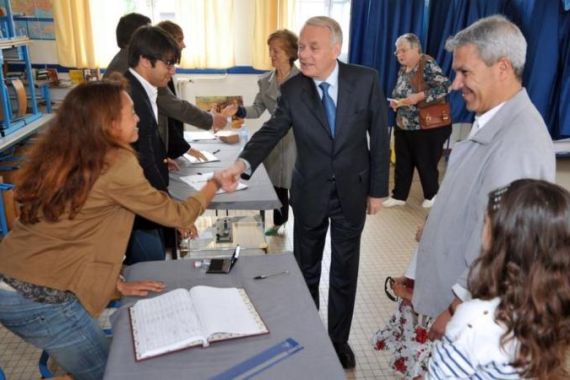French left seeks gains in runoff elections
President Francois Hollande’s Socialists target solid majority in National Assembly in second-round parliamentary vote.

Voting in France is under way in general election runoff contests expected to hand President Francois Hollande’s Socialist Party a clear parliamentary majority to push his anti-austerity agenda.
Opinion polls released before the end of campaigning showed the Socialists and their parliamentary allies on track to take control of France’s lower-house National Assembly.
Hollande, who defeated right-winger Nicolas Sarkozy in May’s presidential election, has urged voters to give him the majority he needs to steer France through Europe’s debt crisis, rising unemployment and a faltering economy.
The French vote risks being overshadowed however by Sunday’s elections in Greece, which could determine whether Athens stays in the eurozone amid concern over the global economic shock that would result if it were forced to abandon the currency.
The polls showed France’s Socialists winning between 287 and 330 seats in Sunday’s run-off vote – almost certainly enough to secure a majority in the 577-seat Assembly.
Al Jazeera’s Peter Sharp reported from Paris that voter apathy was high.
“[Socialist Prime Minister Jean-Marc Ayrault] really wants to deal with France’s deficit, and to do that he would need a clear majority in the house,” he said.
Since the Greens, who are close allies of the Socialists and already in government, are expected to win up to 20 seats, Hollande is all but guaranteed to get the parliamentary backing he needs.
The Socialists and other left-wing parties came out on top in last Sunday’s first round of the vote, winning 46 percent to 34 percent for Sarkozy’s UMP party and its allies.
Pollsters predict the UMP and its allies will take between 210 and 263 seats in the run-off.
‘Third political force’
The vote will also be a key test for Marine Le Pen’s anti-immigrant and anti-EU National Front (FN), which took 13.6 percent in the first round; far above the four percent it won in the last parliamentary election in 2007.
Le Pen, who said the result confirmed her party’s position as France’s “third political force,” is hoping the FN will be able to take a handful of seats including one for her in a rundown former mining constituency near the Northern city of Lille.
Polls indicate the FN are set to win up to three seats, including for Le Pen and for Marion Marechal-Le Pen, the FN leader’s 22-year-old niece, in the southern Vaucluse area.
After a hard-fought presidential race, the campaign for the parliamentary elections has been lacklustre, with the only major excitement generated by an incendiary tweet fired off by the country’s new unofficial first lady.
The Twitter message by Hollande’s partner Valerie Trierweiler wished good luck to Socialist dissident Olivier Falorni, who is running against Segolene Royal, the president’s ex-partner and mother of their four children, in the western town of La Rochelle.
There has long been speculation of intense rivalry between Royal and Trierweiler.
Hollande stood loyally by Royal as she battled Sarkozy for the presidency in the 2007 race, but he had reportedly been in a relationship since 2005 with Trierweiler, a twice-divorced 47-year-old mother of three.
The UMP said the tweet was an inappropriate intrusion of Hollande’s personal life into politics, but analysts said that despite widespread media coverage it was unlikely the scandal would have much impact on the Socialists’ result.